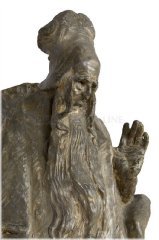Halloween, a very popular holiday in the US, is not an official holiday in the Czech Republic. However, that does not mean they don’t have a celebration. Dušičky, or All Soul’s Day, is celebrated on Nov 2nd every year by placing flowers and lighting candles on the graves of loved ones. While not quite as spooky or sugary as the American version, this is an important holiday to many in the Czech Republic.
This is not to say that the Czech Republic doesn’t have its ghosts and magic. One of the most famous stories in Prague is the story of Rabbi Loew and his Golem. Known to most as Rabbi Loew or Maharal of Prague, Rabbi Loew was a great man with many accomplishments. Still, Golem is not the only magic the Rabbi is known for. This is the story of the Magic on Charles Bridge.
Magic on Charles Bridge
The story starts with a terrible drought. Emperor Rudolf II resided in Prague and wished to aid the starving people under his reign. On the advice of his advisor, the Emperor gave Jews living in a ghetto of Prague a week to vacate, as to conserve local resources. In addition to leaving their homes, they were forbidden to take any gold, silver, or jewels, as they were the property of the Emperor.
The Jews rushed to the head Rabbi Loew for help. He went to the castle but was denied entrance. He returned the next day in an attempt to wait with a group to compete for an audience with the emperor. However, a man identified him as a Jew by the yellow circle he was required to wear on his chest and he was thrown out.
Undeterred, he devised a new plan. The Emperor was known to take a carriage across Charles bridge on the way to the country to hunt. So, the Rabbi stood in the middle of Charles Bridge and resolved he would not move for the emperor’s carriage. The trumpets sounded and the carriage raced forward; still, he did not move. Bystanders began to scream and throw rocks at him in an attempt to dissuade him. It is said the rocks turned to flowers before they landed and rained upon him.
Impressed and curious about this power, the emperor, a scholar himself, invited the Rabbi to visit him at the castle in two days. On the day of the meeting, the Rabbi was escorted to the Emperor’s study in his private chambers. This meeting lasted for several hours, and many began to grow concerned when the Emperor and the Rabbi finally emerged. That evening, the Emperor rescinded the banishment of the Jews and swore anyone who attacked the Jewish Ghetto would be swiftly punished.
This was the only meeting between the two ever recorded. However, it is said the Rabbi was invited back to the castle several times. It is even said that the Emperor would occasionally visit the Rabbi’s home, and he was so astounded by all he saw.
Written by Kelsey McDade
Patrick, Michele. Haunted Prague. Penfield Books, 2019, pg. 128-133, (Accessed October 25, 2022).
Editors of Britannica, The, ‘Rudolf II’, Britannica, 2022, https://www.britannica.com/biography/Rudolf-II-Holy-Roman-emperor, (Accessed October 25, 2022).
Editors of New Word Encyclopedia, The, ‘Juda Loew ben Bezalel’, New World Encyclopedia, 2022, https://www.newworldencyclopedia.org/entry/Judah_Loew_ben_Bezalel, (Accessed October 25, 2022).
Richter, Jan, ‘Rabbi Loew, the Jewish hero of the Czechs’, Radio Prague International, 2009, https://english.radio.cz/rabbi-loew-jewish-hero-czechs-8582008, (Accessed October 27, 2022).
Expats.cz Staff, ‘Halloween 2022 in Prague: Where to scare up some fright-night thrills’, Expats, 2022, https://www.expats.cz/czech-news/article/halloween-2022-in-prague, (Accessed October 28, 2022).



